Africa’s Social and Economic History

Os Ismailis Lusófonos, os Aga Khan e Portugal: mais de um século de história (Sec xix-xxi)
Abstract:
The commemoration of the 60th anniversary of the rise to the Imamate of Aga Khan IV, His Highness Prince Karim al Husseini, is a moment of particular significance for Ismailis worldwide, especially for those living in Portugal and Spain. While it is important to underline the recent and highly significant developments with regards to the relations between the current Imam and the Portuguese state, much can be gained from providing an historical perspective on this matter. This paper aims to contribute to such endeavour, by analysing both the stablishment of ties between Aga Khans III and IV and the Portuguese Empire on both sides of the Indian Ocean, as well as by examining the history of the Ismaili community then installed in Mozambique.
Quotation:
Nicole Khouri y Joana Pereira Leite, «Os Ismailis Lusófonos, os Aga Khan e Portugal: mais de um século de história (Sec xix-xxi)», Mélanges de la Casa de Velázquez [En línea], 53-2 | 2023, Publicado el 24 noviembre 2023, consultado el 07 diciembre 2023. URL: http://journals.openedition.org/mcv/20283; DOI: https://doi.org/10.4000/mcv.20283

História de São Tomé e Príncipe de Meados do Século XIX ao Fim do Regime Colonial (1852-1974): As plantações, economia, cultura e religião
Abstract:
This book explains the reasons that led the Portuguese to recolonize the São Tomé and Príncipe islands from 1852 onwards and the strategies they adopted to institutionalize the new colonial order in the archipelago. They removed the natives from ownership of land and institutions and introduced the plantation economy model around which all economic and social life began to revolve, with the territory being divided between the populations of large plantations and the native populations. Work and land were exploited to the point of exhaustion, with mistreatment, racial discrimination, and a progressive decline in soil productivity. The production crisis emerged and exposed the limits of the plantation economy model. There were several attempts to forcefully hire native labor, which generated many conflicts and led to the “Batepá” massacre of 1953. This event raised the awareness of nationalists for the independence of the archipelago, which occurred on July 12, 1975. The book also addresses culture and religion as central elements that shape São Tomé and Príncipe society and identity.
Quotation:
Espírito Santo, A. (2023). História de São Tomé e Príncipe – De Meados do Século XIX ao Fim do Regime Colonial (1852-1974): As plantações, economia, cultura e religião. Lisboa: Nimba Edições.
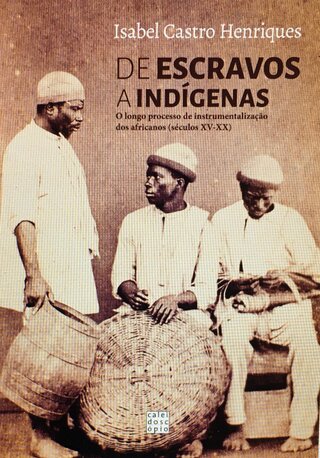
De escravos a indígenas: O longo processo de instrumentalização dos africanos (séculos XV-XX)
Abstract:
De Escravos a Indígenas: o Longo Processo de Instrumentalização dos Africanos (Séculos XV-XX), which brings together a set of texts written over forty years and dispersed in publications of diverse nature, not always easily accessible, aims to contribute to a renewal of historiography on the relations between Portugal and Africa, in the specific field of the forms of instrumentalisation of Africans carried out by the Portuguese for almost five centuries. A long process, whose internal nature proved capable of metamorphosis and reconversion in the nineteenth and twentieth centuries, ensuring the continuity of the violent ‘use’ of African populations, resorting to a new classificatory apparatus – savages, indigenous, assimilated – aimed at keeping Africans within the sphere of Portuguese domination, contributing to legitimising their enslavement and fixing distorting interpretations of History.
If a first line of study aims to review the history of slavery and slave trafficking and their ideologies in spaces of Portuguese ‘occupation’ like Angola, a second line of study privileges iconographic documents as historical sources, emphasizing their historical and informative dimension. Finally, the third line of this study seeks to highlight the evolution of the process of Portuguese instrumentalisation of Africans, which resorts to unprecedented classificatory categories – savage, indigenous, assimilated – and to practices that emerge from the slave labour of the past to ensure the colonial exploitation of African populations.
Value judgments, commodification, objectification, exploitation, ridiculing of African men fabricated Portuguese imaginaries that reduced the black/African to slavery, the savage/indigenous to lazy, thieving and drunk, the assimilated/’civilised’ to a ridiculous and negative copy of the white/Portuguese, enshrining the inferiorization of Africans, and in the same movement, glorifying the Portuguese ‘race’, hierarchizing the humanities and valuing the dimension and nature of the Portuguese actions, first slave-owning and then colonialist, that have left their mark on Portuguese society to this day.
Quotation:
Henriques, Isabel C., De Escravos a Indígenas: o Longo Processo de Instrumentalização dos Africanos (Séculos XV-XX), Lisboa, Ed. Caleidoscópio, 2019.
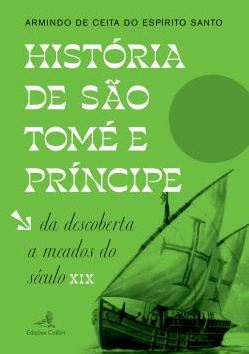
História de São Tomé e Príncipe: da descoberta a meados do século XIX
Abstract:
In História de São Tomé e Príncipe: da descoberta a meados do século XIX, the author explains how the Portuguese navigators arrived on the islands of São Tomé and Príncipe in the third quarter of the fifteenth century and transformed them into a social context for their development, but in which human and institutional relations were complex and even unbearable for the most disadvantaged, particularly on the island of São Tomé. Conflicts of all kinds worsened, particularly after the transition from a residential to a plantation society, with the intensification of the slave trade and the production and export of sugar. The long distance of the islands from the central power, located in Lisbon, constituted an ingredient that favoured the fomentation of conflicts in which the disrespect for the established rules was permanent and maintained during the period of domination of the native elite since the 17th century, marked around the main families that disputed access to power and control of wealth. The author shows that, despite its harshness, the colonial slave model had dynamics of social mobility that allowed some enslaved people to become free and others to become powerful in economic and political terms, even during the 16th century, becoming dominant until the mid-19th century.
Quotation:
Espírito Santo, A. (2021). História de São Tomé e Príncipe: da descoberta a meados do século XIX. Lisboa: Edições Colibri.
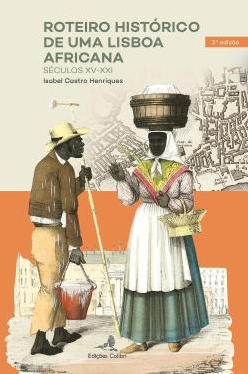
Historical Guide to an African Lisbon
Abstract:
Lisbon, a city of as many valleys and hills as there are myths surrounding its history and the people who invented it, stretches along the Tagus, where the river ends its course through Iberian land and plunges into the Atlantic Ocean. Lisbon was born on the hill of São Jorge Castle, where a Bronze Age settlement left its traces, which crossed with many other marks engraved by Greeks, Phoenicians, Lusitanians, Romans, Visigoths, Arabs, Jews and Christians. A long road of people and cultures, of stories and legends, of gods and heroes who, like Ulysses the mythical founder of the city – Olisipo – which owes its name to him, built and rebuilt this urban space. The aim of Historical Guide to an African Lisbon, XV-XXI Century is to show Lisbon’s Africanness, dispersed in a plurality of memories and immaterial and invisible traces in the days in which we live. History tells us about the settlement and life of thousands of Africans who for centuries took part in the process of building the Portuguese national fact. Travelling through the city, armed with historical knowledge, we are surprised by the vigorous African presence that invaded all spaces of Lisbon society, we reconstruct a hidden Lisbon, submerged by a centuries-old prejudice that still dominates our collective imagination and we understand, with greater clarity, not only behaviours, values, practices that remain in urban daily life, but also the constant reinventions of Portuguese and African identities, present in the country.
Quotation:
Castro Henriques, I. (2021). « Historical Guide to an African Lisbon, XV-XXI Century», versão revista e actualizada, Lisboa, Edições Colibri, 2021.
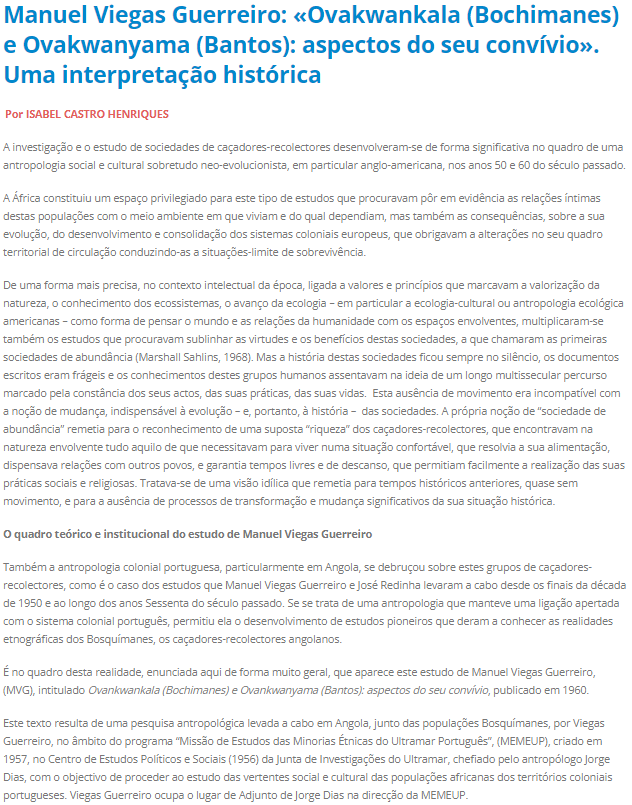
Manuel Viegas Guerreiro: «Ovakwankala (Bochimanes) e Ovakwanyama (Bantos): aspectos do seu convívio». Uma interpretação histórica.
Abstract:
The research and study of hunter-gatherer societies developed significantly within the framework of a mainly neo-evolutionist social and cultural anthropology, particularly Anglo-American, in the 1950s and 1960s. Africa constituted a privileged space for this type of study which sought to highlight the intimate relations of these populations with the environment in which they lived and on which they depended, but also the consequences, on their evolution, of the development and consolidation of the European colonial systems, which forced changes in their territorial framework of circulation, leading them to situations at the limits of survival. In a more precise manner, in the intellectual context of the time, linked to values and principles which marked the valorisation of nature, knowledge of ecosystems, the advance of ecology – in particular American cultural-ecology or ecological anthropology – as a way of thinking about the world and humanity’s relations with the surrounding spaces, there was also a multiplication of studies seeking to underline the virtues and benefits of these societies, which were called the first societies of abundance (Marshall Sahlins, 1968). But the history of these societies always remained silent, the written documents were fragile and knowledge of these human groups was based on the idea of a long, multi-secular path marked by the constancy of their acts, their practices and their lives. This absence of movement was incompatible with the notion of change, which is indispensable to the evolution – and therefore the history – of societies. The very notion of “society of abundance” referred to the recognition of a supposed “wealth” of hunter-gatherers, who found in the surrounding nature everything they needed to live in a comfortable situation, which solved their food needs, dispensed with relations with other peoples, and guaranteed free time and rest, which easily allowed them to carry out their social and religious practices. This was an idyllic vision that referred back to previous historical times, almost without movement, and to the absence of significant transformation and change processes in their historical situation. In Manuel Viegas Guerreiro: «Ovakwankala (Bochimanes) e Ovakwanyama (Bantos): aspectos do seu convívio». Uma interpretação histórica. Isabel Castro Henriques comments on the homonymous study conducted by Manuel Viegas Guerreiro.
Quotation:
“Castro Henriques, I. (2021). «Manuel Viegas Guerreiro – Ovakwankala (Bochimanes) e Ovakwanyama (Bantos): aspectos do seu convívio. Uma interpretação histórica. Lisbon, Newsletter Fundação Manuel Viegas Guerreiro, no 27, julho-setembro 2021, pp. 10-16.”
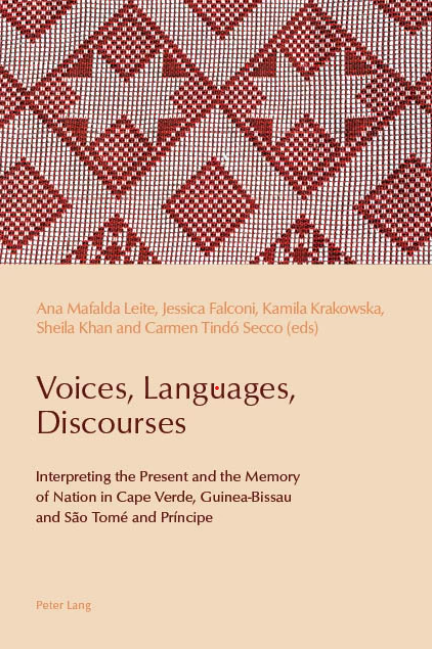
Voices, Languages, Discourses: Interpreting the present and the memory of Nation in Cape Verde, Guinea-Bissau and São Tomé and Príncipe
Abstract:
Voices, Languages, Discourses: Interpreting the Present and the Memory of Nation in Cape Verde, Guinea-Bissau and São Tomé and Príncipe brings together a selection of interviews with writers and filmmakers from Cape Verde, Guinea-Bissau and São Tomé and Príncipe in order to examine representations and images of national identity in these countries’ postcolonial narratives. It continues and completes the exploration of the postcolonial imaginary and identity of Portuguese-speaking Africa presented in the previous interview volume Speaking the Postcolonial Nation: Interviews with Writers from Angola and Mozambique (2014). Memory, history, migration and diaspora are central notions in the recreation and reconceptualisation of the nation and its identities in Cape Verdean, Guinean and São Tomense literary and film culture. By bringing together different generations of writers and filmmakers, with a wide variety of perspectives on the historical, social and cultural changes that occurred in their countries, this book makes a valuable contribution to current debates on post-colonialism, nation and identity in these former Portuguese colonies.
Quotation:
Leite, A., M., Falconi, J., Krakowska, K., Kahn, S., Secco, C. (2020). Voices, Languages, Discourses: Interpreting the Present and the Memory of Nation in Cape Verde, Guinea-Bissau and São Tomé and Príncipe. Oxford, United Kingdom: Peter Lang Verlag. Retrieved Oct 6, 2022, from https://www.peterlang.com/document/1055586
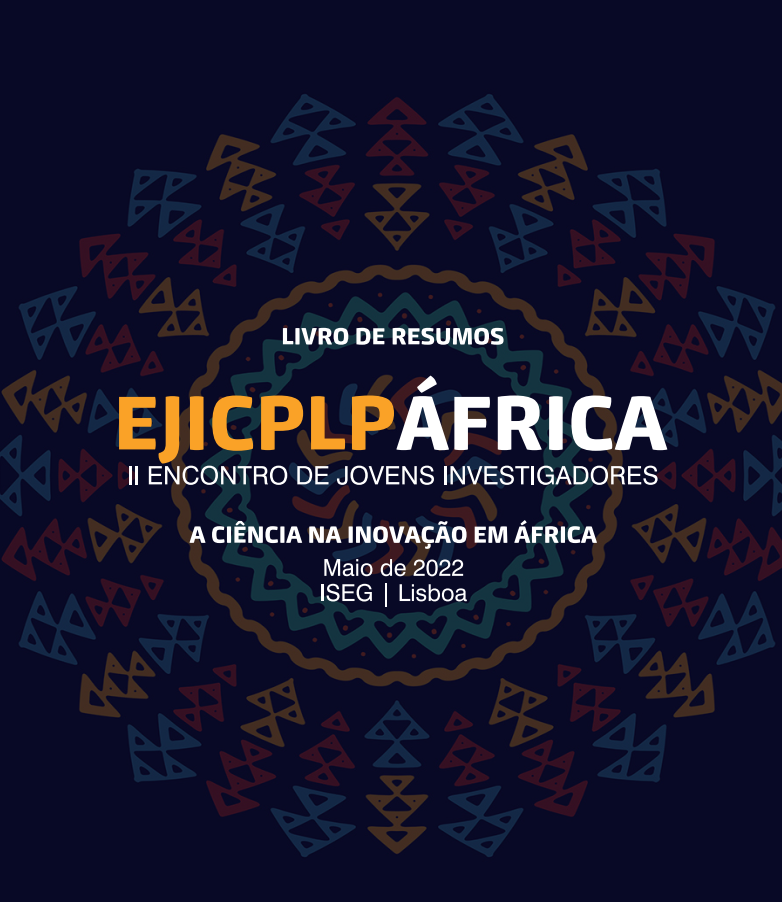
Ebook – EJICPLP Africa: Science in Innovation in Africa
Abstract:
The Meeting of Young Researchers from CPLP on Africa is an inclusive space for debate and scientific dissemination in African studies and in Portuguese language, in an innovative, democratic and multicultural perspective. The success of this project began in 2021, when it was proposed to bring participation and protagonism to young people, as agents of change in a living community in permanent transformation. In this context, the 2nd Meeting was held in May 2022, in Lisbon, where the role of science in innovation in Africa was discussed, exceeding all expectations, whether in the quality of the debates, the excellence and diversity of the works presented, or the massive adhesion of the participants. The Meeting took place thanks to the work carried out by the Organising Committee, an International Scientific Council, with the collaboration of the Centre for African and Development Studies (CEsA), as the proponent entity. in addition to the support of other partner institutions, such as the CPLP, Lisbon City Council (CML), Higher Institute of Economics and Management (ISEG), Catholic University of Angola (UCAN), Union of Portuguese Speaking Capital Cities (UCCLA), Eduardo Mondlane University (UEM – Mozambique), Association of Municipalities for Sustainable Development of the Umbria Region (FELCOS – Italy). The 2º Encontro de Jovens Investigadores da CPLP sobre África – Livro de Resumos was only possible thanks to the collaboration of numerous people, in particular the Organizing Committee, the Scientific Council, the Speakers, the Institutional Partners, the Medias Partners, the Volunteers and the Scientific Community.
Quotation:
D’Abril, Cristina Molares [et al.] (2022). “2º Encontro de Jovens Investigadores da CPLP sobre África. Livro de Resumos”. ISBN: 978-989-54687-3-7
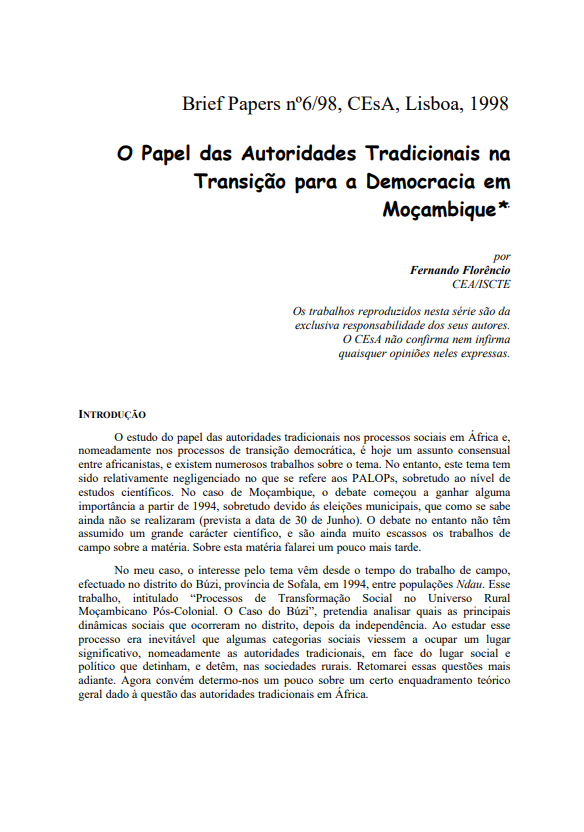
Brief Paper 6/1998: O Papel das Autoridades Tradicionais na Transição para a Democracia em Moçambique
Abstract:
The study of the role of traditional authorities in social processes in Africa, namely in the processes of democratic transition, is today a consensual issue among Africanists, and there are numerous works on the subject. However, this theme has been relatively neglected in what concerns the PALOPs, especially at the level of scientific studies. In the case of Mozambique, the debate started to gain some importance as from 1994, mainly due to the municipal elections, which as we know have not yet taken place (scheduled for 30 June). However, the debate has not taken on a scientific character, and fieldwork on the subject is still very scarce. I will talk about this subject a little later. In my case, the interest in the theme comes from the time of fieldwork, carried out in Búzi District, Sofala Province, in 1994, among Ndau populations. This work, entitled “Processes of Social Transformation in the Rural Universe of Post-Colonial Mozambique. The Case of Búzi”, intended to analyse the main social dynamics that occurred in the district after independence. In studying this process it was inevitable that some social categories would come to occupy a significant place, namely the traditional authorities, in view of the social and political place they held, and hold, in rural societies. I will return to these issues later. It is now convenient to dwell for a moment on a certain general theoretical framework given to the question of traditional authorities in Africa. Communication presented at the CESA 1998 Seminar: A Problemática do Desenvolvimento – Historicidade e Contributos Actuais numa Óptica Transdiciplinar (The Problem of Development – History and Current Contributions from a Transdisciplinary Perspective), Conference O Papel das Autoridades Tradicionais na Transição para a Democracia em Moçambique (The Role of Traditional Authorities in the Transition to Democracy in Mozambique), 14th May 1998.
Quotation:
Florêncio, Fernando. 1998. “O papel das autoridades tradicionais na transição para a democracia em Moçambique”. Instituto Superior de Economia e Gestão – CEsA Brief papers nº 6-1998.
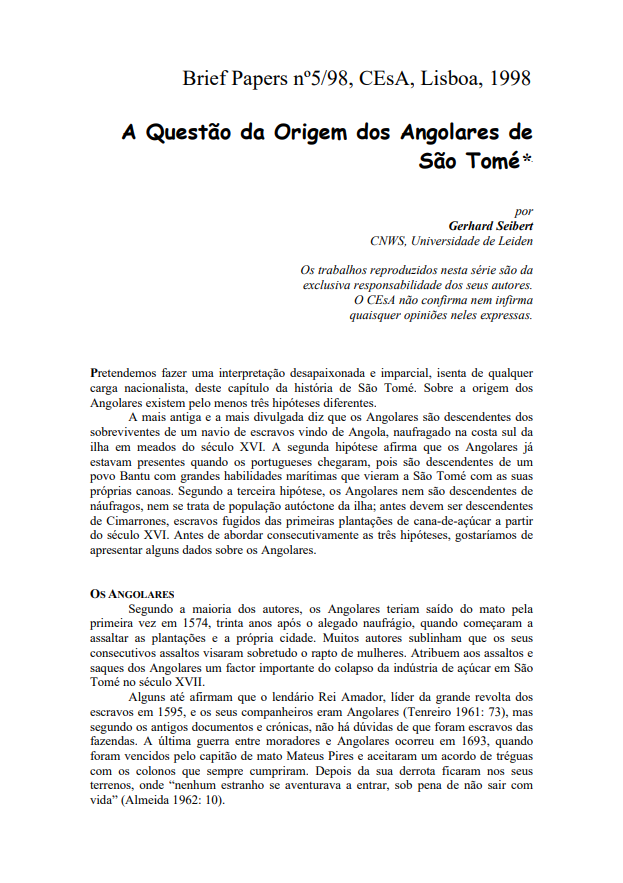
Brief Paper 5/1998: A Questão da Origem dos Angolares de São Tomé
Abstract:
We intend to make a dispassionate and impartial interpretation, free of any nationalist charge, of this chapter in the history of São Tomé. There are at least three different hypotheses about the origin of the Angolares. The oldest and most widespread says that the Angolares are descendants of the survivors of a slave ship from Angola that sank off the southern coast of the island in the mid-sixteenth century. The second hypothesis states that the Angolares were already present when the Portuguese arrived, since they are descendants of a Bantu people with great maritime skills who came to São Tomé with their own canoes. According to the third hypothesis, the Angolares are neither descendants of castaways, nor are they an indigenous population of the island; rather, they must be descendants of Cimarrones, runaway slaves from the first sugar cane plantations after the 16th century. Before dealing consecutively with the three hypotheses, we would like to present some data about the Angolares. Paper presented at the 1998 CESA Seminar: A Problemática do Desenvolvimento – Historicidade e Contributos Actuais numa Óptica Transdiciplinar (The Problem of Development – History and Current Contributions from a Transdisciplinary Perspective), Conference on A Questão da Origem dos Angolares em São Tomé (The Question of the Origin of the Angolares in São Tomé), 19 May 1998.
Quotation:
Seibert, Gerhard. 1998. “A questão da origem dos Angolares de São Tomé”. Instituto Superior de Economia e Gestão – CEsA Brief papers nº 5-1998.





